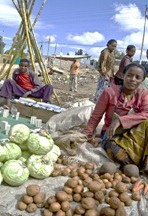A New Approach to Water Allocation: "Virtual Water"
by Alma Bilopi, ALL-AFRICA.COM, July 3o, 2010
 The vegetables Omphemetse Monyi sells at the Francistown bus rank come from 400 kilometres away in South Africa. One approach to development might seek to replace her suppliers with local farmers, but Southern Africa’s water managers are considering the merits of reinforcing a regional trade in “virtual water”.
The vegetables Omphemetse Monyi sells at the Francistown bus rank come from 400 kilometres away in South Africa. One approach to development might seek to replace her suppliers with local farmers, but Southern Africa’s water managers are considering the merits of reinforcing a regional trade in “virtual water”.
Depending on the season, Monyi sells watermelons, tomatoes, potatoes, onions from the back of her truck. The 44-year-old makes the trip to South Africa each week to purchase vegetables for sale; she says she buys about 10,000 pula worth of stock ($1430), and makes a profit of between P3,000 and P4,000.
It’s not just informal traders who bring fruit and vegetables to northern Botswana from elsewhere. The supermarkets down the road from her stall also import their produce from South Africa. It’s part of a trade in virtual water, though Monyi doesn’t think of it that way.
“For those [Botswana farmers] who do harvest and sell, they do not produce the quality that we get in the South African farms. Take potatoes for example, they will not be cleaned well and not packaged according to size,” she says.
Until recently, one of the first questions economists might ask would be, why can’t the farmers in Botswana compete? The answers might include disadvantages in terms of good soil and sufficient water, or capital to allow them to mechanise production and put more land under cultivation. The recommendation might be to address these problems to help local farmers gain a foothold in their local market.
But some disadvantages cannot readily be overcome with money or training. Enriching soil, for example, is a slow process, but possible.
Increasing available water presents its own challenges. Irrigation schemes can be prohibitively expensive to construct and maintain; the high temperatures and low humidity in northern Botswana can mean significant amounts of precious water are lost to evaporation. When these costs are factored in, even irrigation may not allow local farmers to produce vegetables or fruit at a competitive price.
David Phillips an independent consultant and researcher based in Namibia, explains that countries can use virtual water to strategically enhance their overall access to fresh water.
“Perhaps the best examples of this are Israel and Egypt, both of whom import large quantities of foodstuffs and other items containing virtual water. Israel for example uses about 2.2 cubic kilometres of fresh water annually but imports about three times this volume every year in virtual water form.”
The concept of virtual water means thinking of an agricultural product – or other commodity – in terms of the amount of water required to produce it.
Due to richer soils, lower temperatures and evaporation, and better farming techniques, a thousand litres of water used in a farm along the South African stretch of the Limpopo will produce more tomatoes or sugar than the same amount of water used somewhere upstream in Botswana, where the river runs through more arid countryside.
Phillips is one of those involved in developing guidelines for basin-wide management of transboundary rivers in the Southern Africa region.
He explains how virtual water can give managers additional flexibility in negotiating allocation of water resources. The idea is that certain countries have optimal conditions for growing food; a benefit-sharing approach is to maximise production of crops per unit volume of water. [Read rest of article]


